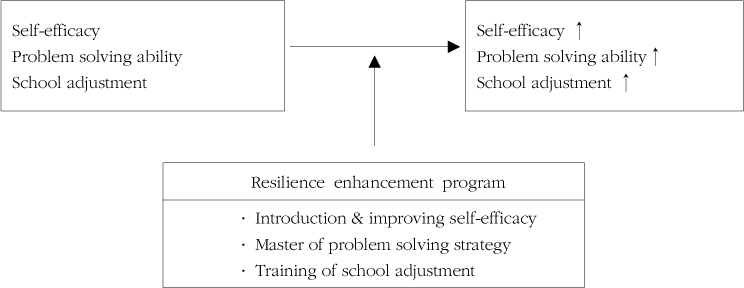J Korean Acad Psychiatr Ment Health Nurs.
2010 Dec;19(4):400-410. 10.12934/jkpmhn.2010.19.4.400.
Effects of a Resilience Enhancement Program on Self-efficacy, Problem Solving Ability, and School Adjustment of Middle School Students
- Affiliations
-
- 1College of Nursing, Chonnam National University, Korea.
- 2Chonnam National University Research Institute of Nursing Science, Korea.
- 3Department of Nursing, College of Medicine, Chosun University, Korea. yrk@chosun.ac.kr
- 4Gwangju Namgu Mental Health Center, Korea.
- KMID: 2321874
- DOI: http://doi.org/10.12934/jkpmhn.2010.19.4.400
Abstract
- PURPOSE
This study was done to examine the effects of a resilience enhancement program for middle school students.
METHODS
The research design was a quasi-experimental pre-and-post-test control and experimental group methodological comparison study. The participants for the study were 124 (experimental=60, control=64) middle school students in G city. The experimental group received the program for eight sessions. The control group did not receive any treatment. From April to June 2009 data were collected using self-report structured questionnaires, and were analyzed using the Kolmogorov-Smirnov test, chi2-test, Fisher's exact test, and t-test with SPSS/WIN 15.0 program.
RESULTS
After the treatment, significant differences were found between the experimental and control groups in terms of problem solving ability (t=2.52 p=.007) and school adjustment (t=1.66, p=.004), but not in level of self-efficacy (t=0.80, p=.212).
CONCLUSION
The findings indicate that this program can be used in school based practice as an effective nursing intervention for adolescents.
Keyword
Figure
Reference
-
1. Bak BG, Lee SY, Song JH. Development of ego-resiliency enhancement program and testing its effects. Korean J Educ Psychol. 2010; 24(1):61–82.2. Bandura A. Self-efficacy: Toward a unifying theory of behavioral change. Psychol Rev. 1977; 84:191–215.
Article3. Berman AL, Jobes DA, Silverman MM. Adolescent suicide: Assessment and intervention. 2nd ed.Washington, DC: American Psychological Association;2006.4. Block J, Kremen AM. IQ and ego-resiliency: Conceptual and empirical connection and separateness. J Pers Soc Psychol. 1996; 70:349–361.
Article5. Cho MJ, Lee JH. The self-regulation program development for youth and verification of its effects. Korean J Couns Psychother. 2009; 6(1):31–46.
Article6. Common Wealth of Australia. Mind Matters: Enhancing resilience program. 2001. Retrieved January 15, 2007. from http://cms.curriculum.edu.au/mindmatters.7. Compas BE, Hinden BR, Gerhardt CA. Adolescent development: Pathway and processes of risk and resilience. Annu Rev Psychol. 1995; 46:265–293.8. Garmezy NZ. Stress-resistant children: The search for protective factors. In : Stevenson JE, editor. Recent research in developmental psychopathology. New York: Pergamon Press;1985. p. 213–233.9. Han SC. The effects of the program for improving protective factors on a resilience of "at-risk" adolescents. Korean J Educ Psychol. 2006; 20(1):119–136.10. Heppner PP, Peterson CH. The development and implications of a personal problem-solving inventory. J Couns Psychol. 1982; 29:66–75.
Article11. Hernandez LP. The role of protective factors in the school resilient Mexican American high school students. California, USA: Stanford University;1993. Unpublished doctoral dissertation.12. Higgins G. Resilient adults: Overcoming a cruel past. San Francisco, CA: Jossey-Bass;1994.13. Hong YS. The effect of life stress on adolescent suicidal behaviors and the buffering effect of problemsolving ability. J Korean Soc Child Welf. 2005; 20:8–33.14. Jeong IS. Effect of resilience enhancement group counseling program on school adjustment and stress coping ability of high school students. Chungbuk: Korea National University of Education;2007. Unpublished master's thesis.15. Kim AY. A study on the academic failure-tolerance and its correlates. Korean J Educ Psychol. 1997; 11(2):1–19.16. Kim HK. The development and validation of a narrative therapy program for school maladjusted youth. Korean J Couns Psychother. 2010; 22:329–349.17. Kim MS. A study on the resilience as influential factors to juvenile delinquents' daily stress. Pusan: Pusan University;2002. Unpublished master's thesis.18. Kim SM. Effect of reality therapy on the internal locus of control and problem solving ability of inpatients with psychotic disorder. Jinju: Gyeongsang National University;2004. Unpublished master's thesis.19. Kim YR. An analysis on the validation of school learning motivation scale (a) & school-related coping scale (b) and relations between (a) & (b). J Educ Res Hongik Uiv. 2000; 17:3–37.20. Lee HJ, Cho YJ. The exploratory study of longitudinal changes and variables predicting school adjustment. Korean J Youth Stud. 2010; 17:253–278.21. Lee H, Jo HI. A validation study of the resilience scale in Korean adolescents. Korean J Couns Psychother. 2006; 18:353–371.22. Luthar SS, Ciccetti D, Becker B. The construct of resilience: A critical evaluation and guideline for future work. Child Dev. 2000; 71:543–562.
Article23. Moon ES, Kim CH. A structural analysis of the social and psychological variables influencing adolescents' school adjustment behaviors. Korean J Educ Psychol. 2002; 16:219–241.24. Moon SM, Hwang YS. Effects of internal developmental assets program on school resilience in high school girl students. Korean J Youth Stud. 2006; 13(3):49–77.25. Park YS, Kim UC. Factors influencing happiness among Korean adolescents: With specific focus on the influence of psychological, relational and financial resources and academic achievement. Korean J Couns Psychother. 2009; 15:399–429.26. Power TJ. Promoting children's mental health: Reform through interdisciplinary and community partnerships. School Psych Rev. 2003; 32:3–16.
Article27. Roeser RW, Eccles JS. Adolescents' perception of middle school: Relation to longitudinal change in academic and psychological adjustment. J Res Adolesc. 1998; 8(1):123–158.
Article28. Sin HS, Gu BY. Students at high risk of dropping out of school: Do they differ from school dropouts and low-risk students? Korean J Educ Psychol. 2002; 16(3):121–145.29. Song HY, Lim JY, Nam KA. Validation of resilience scale in Korean adolescent. J Korean Acad Psychiatr Ment Health Nurs. 2006; 15:31–39.30. Yoo SK, Shim HW. Psychological protective factors in resilient adolescents in Korea. Korean J Educ Psychol. 2002; 16(4):189–206.
Article
- Full Text Links
- Actions
-
Cited
- CITED
-
- Close
- Share
- Similar articles
-
- The Effects of Learning Styles and Nursing Professional Attitude on Problem-Solving Ability among Nursing Students
- Metacognition, Learning Flow and Problem Solving Ability in Nursing Simulation Learning
- The Effects of Action-Learning based Simulation Practice Program on Interpersonal Communication Competence and Problem Solving Ability of the Nursing Students
- Effects of a Problem-Solving Program on Problem-Solving Ability, Self-Esteem, and Depression for Middle School Girls
- The Effects of Jigsaw Cooperation Learning on Communication Ability, Problem Solving Ability, Critical Thinking Disposition, Self-directed Learning Ability and Cooperation of Nursing Students



